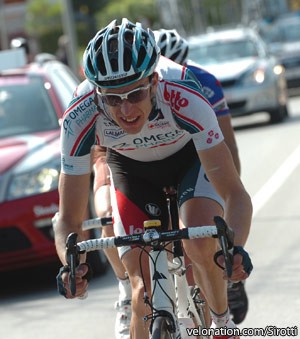Briton writes about his first-time retirement from the race
 Omega Pharma Lotto rider Charly Wegelius has written a poignant reaction to his withdrawal from the Tour de France last week, saying that he was badly shaken by the emotions he felt. The Briton withdrew prior to the start of stage eleven due to the effects of stomach problems he was experiencing. For a rider who previously finished 45th and 59th overall, it was a disappointing end to his race.
Omega Pharma Lotto rider Charly Wegelius has written a poignant reaction to his withdrawal from the Tour de France last week, saying that he was badly shaken by the emotions he felt. The Briton withdrew prior to the start of stage eleven due to the effects of stomach problems he was experiencing. For a rider who previously finished 45th and 59th overall, it was a disappointing end to his race.
“Leaving the Tour de France prematurely is an unpleasant experience, one that I had never tasted until now,” he wrote in his blog. “I sincerely hope I will never have to repeat it. It is a cruel process, that only adds to the physical discomfort that caused your failure in the first place. In my particular case, I didn’t have any scars to show the press, or broken bones. Just a slow, painful, draining of all my energy. I felt like a water bucket with dozens of bullet holes, I was leaking energy left, right, and centre.
“All the food and liquid I put into my body seemed to evaporate, and my legs got weaker and weaker as the hours passed. I had no strength, and slipped endlessly towards the back of the race. I knew I was in trouble when I was struggling to hold the back of the group while many of my colleagues were stopping to pee.”
Weglius said that he also was unable to sleep properly at night, with his body temperature alternating between fever-like symptoms and sensations of coldness. He said his appetite went, and he had an insatiable thirst.
“When you are in bad shape, for whatever reason, it is an entirely different discomfort than the one felt by the chap at the front of the race,” he explained on Blog.canyon.com. “When you have good shape, hurting yourself is almost a pleasure, you revel in it. You feel how fast you are riding and become curious to see how much faster you can go, its like a spiral. When you are in the doldrums, however, the road and wind seems to conspire against you. No gear ratio is ever the right one, the bike feels like someone else’s, and however you try, you always seem to be on the edge, a pedal stroke away from being ejected from the group.”
He said that he didn’t sleep at all the night before he withdrew from the Tour, despite being very fatigued. He lay there, then eventually watched the sun rise, heard the mechanics start their day’s work, and was surprised by his own appearance in the mirror.
“And then I did something I have never done, and hope I will never have to do again. I went to our team manager, Marc Sergeant, and told him that I couldn’t go on. The end.
“In a matter of seconds, my world changes. I become a displaced being. A rider who doesn’t ride. The rest of the team busies itself with its preparations for the stage, and I watch on, in a daze. You don’t know where to sit, its as though you are always in the way. Then comes the ride to the start, team meeting, fans, press…. its the Tour. But I am sitting on the bus, with the weight of guilt and shame pushing down on my shoulders. In my mind, I forget the state I am in, and start to tell myself I could have gone on. You are a quitter, a failure, a hoax.
“How could it come to this? I had one of the best Giro’s of my career, lived like a monk in June, and came to the Tour full of hopes, and even after eleven years, dreams. How childish and naive of me. Something, I don’t even know what, got into my body and began to unravel all my plans. And the ironic thing is that it is probably something quite banal, like a gastric virus or god knows what. But the fact remains that it was enough to send me crawling home, weak and pale, with my tail between my legs.”
Wegelius’ well-written account and honest expression of his feelings give an insight into how cruel the Tour de France can be, and how the physical relief of pulling out of the race is afterwards replaced by the mental anguish of doing so.